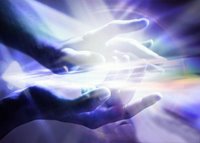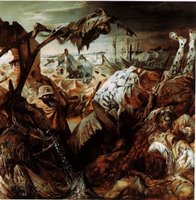 I find the concept of “Absolute Truth” or “Universal Truth” fascinating. From my understanding, “Absolute Truth” (or AT as I will call it) states that there is but one truth for all time. It states that there is only one reality and that reality has one history and one future and one present. The truth is inflexible and unchanging. This concept is impossible to anyone who takes three seconds to think about it.
I find the concept of “Absolute Truth” or “Universal Truth” fascinating. From my understanding, “Absolute Truth” (or AT as I will call it) states that there is but one truth for all time. It states that there is only one reality and that reality has one history and one future and one present. The truth is inflexible and unchanging. This concept is impossible to anyone who takes three seconds to think about it.There is this old saying that states there are always three sides to any story: yours, mine, and what really happened. Three versions is not one absolute truth when one considers that we always think of it as TWO sides to any story. No place for what really happened because there is no “what really happened”. There is no absolute truth because much of history is subjective. There is no absolute truth because science is subjective. How many times are concepts in both reversed after a period of time? Are eggs good for me or bad? Do I eat only the yolks, or do I eat only the whites? Can I fry them and should it be white bread or wheat?
 So what exactly is truth then? How can we ever really know what is true? Can we trust our eyes? Our memory? Our history? It is obvious that some are willing to kill to defend something they think is under attack. That is their truth. Does that mean that is reality?
So what exactly is truth then? How can we ever really know what is true? Can we trust our eyes? Our memory? Our history? It is obvious that some are willing to kill to defend something they think is under attack. That is their truth. Does that mean that is reality?Always remember that reality is but a fraction of a second long. That is it. Everything else is just memory or premonition. At any given time you only have a fraction of a second to really understand what is happening. Every moment after that relies on a flawed memory that gets more flawed every fraction of a second that passes. Even a camera cannot capture every moment that an eye can, so we cannot rely on video recording to help with this dilemma. We are cursed to depend upon memory and records.
There is another old saying which states that history is always written by the winners. Winners are not always the “good guys” in the grand scheme of things, but the history as recorded by them will never portray anything less. Think about the “Revolutionary War” or the “American War of Independence” depending on which side of the Atlantic you are on. If the British had won then our founding fathers would go down in history as traitors and criminals who rose against the king. They won so instead they are heroes and our founders. Does that make either version any truer than the other? Are the Iraqis insurgents or rebels? Are we occupiers or liberators? It will all depend on how we handle this collection of moments.
 Either way, there is no answer because there is no single version of events. The Civil War was not about any one issue because not everyone fought for the same reason. The war in Iraq, World War 2, or any other conflict you can think of or been apart of is certainly not how you think it was nor is it how anyone else thinks either. If there is an “Absolute Truth” then it is beyond our grasp and beyond our reach. All we are left with is our own personal experience that we think is a common one, but each is as different as snowflakes.
Either way, there is no answer because there is no single version of events. The Civil War was not about any one issue because not everyone fought for the same reason. The war in Iraq, World War 2, or any other conflict you can think of or been apart of is certainly not how you think it was nor is it how anyone else thinks either. If there is an “Absolute Truth” then it is beyond our grasp and beyond our reach. All we are left with is our own personal experience that we think is a common one, but each is as different as snowflakes.Or, as Dave Mason put it in 1977:
So let's leave it alone 'cause we can't see eye-to-eye
There ain't no good guys, there ain't no bad guys
There's only you and me and we just disagree
I suppose there is one universal truth: the battles that rage over the stubbornness of "my reality" costs boths sides in the long run. I am probably just babbling though.
4 comments:
That's very true that to every story, there's your side, their side, and what really happened. If there's one inflexible rule to truth, that's probably it.
Absolute truth? I'm not sure there is such a thing. Too many ifs, ands, buts, and gray areas. It really outrages me, though, when someone tries to shove their ideal of Absolute Truth down your throat.
That's very true that to every story, there's your side, their side, and what really happened...
How true...
How can anyone see absolute truth in anything? We, personally, cannot. We immediately apply a seemingly infinite number of filters and modifications to whatever we see or experience both consciously or subconciously. While the truth may be out there, it cannot be seen because to see it is to interpret it and once you do that, it ceases to be the absolute truth and becomes your absolute truth.
That post is almost Dr Seuessian. Kinda Lewis Carrol logic =D
Post a Comment